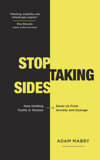
“You can’t let those people think that they could have voted for Donald Trump and actually be Christians!” I preach with an edge, but I rarely get yelled at afterward. But, firm in her conviction, she planted herself before me as I stepped off the platform, ready to fight for her side. In my sermon, I had made the point that Christians cannot hate each other, especially over politics. My mistake (in her eyes) was to invoke the 2016 US presidential elections and the derision some Christians lobbed at “those people” who had supported the other side (and how “those people” promptly returned the favor). Apparently, I should have taken her side—the “correct” side.
I tried to explain that Christian love meant loving all the people Jesus bled for, even when they held different political beliefs than we wished they would. After five minutes of my best pastor-voice, she thought silently, and then concluded, “Fine, but you can’t let them think what they did is ok.”
At this point I politely excused myself and headed out the door. The cool New England air greeted me as I walked to the car. Settling into automotive obscurity, I did what many humans now do instinctively—I checked my phone. An email popped up. It was from another Christian who’d heard my sermon, denouncing my approach as taking it too easy on “the lefties.” He informed me that he’d now be looking round for another church—one that was on the “correct” side.
I was silent.
Then—unexpectedly—I laughed.
Perhaps it was the absurdity of getting opposite complaints about the same sermon that made me laugh. Perhaps it was the irony of my main point having been missed entirely, and the approach I’d been preaching against being embodied so perfectly. But I think that mainly my laughter was covering a deep sadness I felt—and still feel—over our tendency as Christians to anathematize each other over so many things.

How to embrace the tensions in the Bible in order to overcome division, anxiety, and fear.
I’m a pastor in Boston, Massachusetts. Pastoring in the educational hub of the world is great. But less great is the close correlation between perceived intelligence and strongly-held opinion. The “smart” folk in the media no longer treat disagreement as an occasion for conversation but for tribal competition, mud-slinging, and point-scoring—and five minutes on any social-media platform will show even the most optimistic of us that the world takes its lead from its media. In their Hidden Tribes study, More in Common—an international initiative trying to understand this phenomenon—found that “many of today’s most contentious issues are framed as us-versus- them identity-based struggles.”
Don’t you wish there was another way? Aren’t you exhausted by the constant arguing? Don’t you wish we’d all start listening, and that Christian spaces, be they physical or virtual, could feel more like heaven than hell? Does it concern you what tribalism is doing to our witness? Do you worry that the “others” may have a point and you’re missing out on something God is offering you, but you daren’t put your head over the parapet of your team’s trench and make that point?
If you wish this, or worry about this, then the antidote is disarmingly simple: Stop Taking Sides.
Truth is truth, and sometimes it’s binary
First, I want to be clear about what I’m not saying.
I’m not saying Christians should never take sides. To be a Christian is to take that side, and to therefore not be a thousand other things. The Christian journey begins with repentance—a literal turning away from sin and toward salvation. Christianity is founded on truths that require turning from the “side” of non-truth.
But... the fact that our faith contains some key binaries doesn’t mean that everything in our faith is similarly binary. Not everything is a hill upon which to die.
Second, I’m not calling for balance, where you try to hold all things as true at once. Truth cannot be balanced with lies. Jesus didn’t “balance” Judaism with Roman paganism, nor did Paul or Peter, who followed him.
Third, I’m not talking about some Aristotelian middle way, choosing the best of what both “sides” have to offer and creating our own path. That’s just the road to autonomy, and away from biblical authority.
Fourth, I’m not talking about saying that everyone’s right and it doesn’t really matter what you think as long as it works for you. A bloody cross—an act of divine disagreement with the way humanity had ruled itself—was the work of a Savior who died precisely because there are matters that matter. “Agreeing to disagree” is often just a mask for pride (they’re wrong, but I can’t be bothered to show them that they are) or for laziness (who knows who’s right, but I can’t be bothered to work it out).
To stop taking sides we must start to see. So, here’s what I offer: a way for you to see where you’re taking sides that the Scripture doesn’t call you to (in fact, it calls you not to) and instead to start holding truths in tension: that is, to let the Bible tell us sometimes that two truths are both-and rather than either-or, and we need to live and grow in the tension of believing and holding to both. To stop sublimating some biblical teachings to others that we prefer, and to start listening to how the Bible is teaching. Here’s why I want to offer it: because holding truth in tension not only brings us more into line with God’s word, but it frees us from the anxiety and outrage that threaten to destroy us. Taking sides and throwing stones steals joy and decimates virtue. My book Stop Taking Sides offers you nine pairs of truths that represent some of the ground on which we are most prone to plant a flag, see the terrain as “either-or,” and fight the “others.” Embrace the tension and you’ll grow in virtue, and gain a fuller experience of the Christian life.
If, like me, you often feel tempted to take sides, take heart. In a world of complexity, we all long for simple answers to hard questions. Like me, you probably feel a lot of pressure to choose your team—to be either this or that— and it’s difficult to resist the herd impulse. Resisting that urge to take sides is difficult, and downright humbling. But that’s part of the point. It takes virtue to state doctrines clearly, and virtue to hold them in tension when Scripture does. Virtue is hard, but nothing truly worth having is easy. Everything good is hard, and virtue is no exception. But, if we’ll take the Bible more seriously, we may start to be known not for what we’re against, but for an attractive virtuousness.
Love and wrath. Sovereignty and responsibility. Victory and suffering. Some of the truths we read in the Bible seem to be in opposition to each other. We naturally tend to gravitate towards a side, but when we lose sight of one truth in order to protect the other, we are in danger of becoming proud, creating division, and diminishing our faith.
In this compelling, inspiring, and at times provocative book, Adam Mabry urges us to stop taking sides and refuse to participate in tribalism by mapping out a way to hold in tension truths that we so often divide over.
Find out more about Stop Taking Sides.